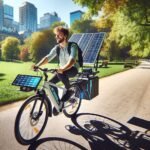Traveling in an RV equipped with solar panels allows for freedom and flexibility on the road. However, to ensure your journey remains powered by the sun without interruption, it’s essential to maintain your solar setup efficiently.
This small guide provides essential tips to keep your solar-powered RV running smoothly, so you can focus on the adventure ahead.
Maintaining an RV solar system is not just about keeping the lights on; it’s about maximizing performance and longevity. Let’s delve into common pitfalls to avoid, ways to enhance solar efficiency, and the best maintenance practices that will help your solar-powered rig thrive.
Common RV solar mistakes to avoid
One of the pitfalls of RV solar systems is improper installation, which can lead to reduced efficiency or even damage to your system. Understanding the orientation and angling of panels is crucial for optimal sunlight capture.
 How solar bikes are changing the future of urban mobility
How solar bikes are changing the future of urban mobilityAdditionally, ensuring that the wiring and connections are correctly done can save you from potential electrical issues.
Many users underestimate their energy needs, leading to insufficient power. A detailed assessment of your electricity consumption will help you determine the right size for your solar array. Overloading or underutilizing your system can both have negative impacts on its efficiency and lifespan.
Another mistake is neglecting regular maintenance checks. Solar panels are generally low maintenance, but they do require some attention.
Neglecting these checks can lead to a gradual decrease in power output and potentially costly repairs down the line.
Read also: How solar bikes are changing the future of urban mobility
How solar bikes are changing the future of urban mobility Things to know before investing in a solar-powered bicycle today
Things to know before investing in a solar-powered bicycle todayTo avoid these and other common errors, it’s vital to educate yourself about your system and its needs. Investing in a reliable monitoring tool can help track your panels’ performance and detect any anomalies early on.
How to optimize RV solar performance
Getting the most out of your solar panels is not just about avoiding mistakes; it’s also about taking proactive steps to enhance performance. Positioning your RV so that the solar panels get maximum sun exposure throughout the day is a key factor.
Additionally, upgrading to higher efficiency panels can provide more power in the same amount of space.
Using a solar charge controller can significantly improve your system’s efficiency. This device regulates the flow of electricity from the panels to the battery, ensuring that it is charged optimally and preventing overcharging, which can shorten battery life.
Read also: How solar bikes are changing the future of urban mobility
How solar bikes are changing the future of urban mobility Things to know before investing in a solar-powered bicycle today
Things to know before investing in a solar-powered bicycle today Exciting new innovations in solar-powered electric vehicles you need to see now
Exciting new innovations in solar-powered electric vehicles you need to see nowBattery maintenance is another crucial aspect. Regularly checking and cleaning battery connections, as well as monitoring charge levels, will prevent loss of storage capacity and extend the battery’s lifespan.
Consider upgrading to lithium batteries for longer life and better performance.
Finally, reducing your electricity load by switching to LED lighting and energy-efficient appliances can greatly improve your solar system’s performance. This means your panels won’t have to work as hard to meet your energy needs, resulting in a more efficient system.
What are the components of an RV solar system?
An RV solar system consists of several key components, each playing a vital role in the production, storage, and distribution of solar energy. Solar panels are the most visible part of the system, converting sunlight into electrical power.
Read also: How solar bikes are changing the future of urban mobility
How solar bikes are changing the future of urban mobility Things to know before investing in a solar-powered bicycle today
Things to know before investing in a solar-powered bicycle today Exciting new innovations in solar-powered electric vehicles you need to see now
Exciting new innovations in solar-powered electric vehicles you need to see now Reasons why solar-powered drones are the future of delivery
Reasons why solar-powered drones are the future of deliveryNext is the charge controller, which regulates the current flowing to the batteries, protecting them from overcharging. The batteries themselves store the energy produced by the panels for later use.
An inverter then converts the stored DC power into AC power, which is used by most appliances within the RV.
Monitoring systems are also an important component, providing valuable data on the health and efficiency of your solar setup. Understanding how these components interact is crucial for troubleshooting and maintaining your system.
How to properly clean RV solar panels
Cleaning your RV solar panels is a simple but essential maintenance task. Ensuring they are free from dust, dirt, and debris will optimize their performance. Cleaning should be done gently with water and a non-abrasive sponge or cloth to avoid scratching the surface.
It’s generally recommended to clean your panels early in the morning or late in the evening to avoid hot surfaces, which can cause water to evaporate quickly and leave mineral deposits.
Regular cleaning, depending on your travel environment, will keep your panels efficient and effective.
Tips for maintaining flexible solar panels
Flexible solar panels have different maintenance needs compared to their rigid counterparts. They are more susceptible to damage from debris and harsh weather conditions. Regular inspections can help you catch any potential issues early.
When cleaning flexible panels, it’s important to be even gentier to avoid damaging their surface. Avoid stepping on them or placing heavy objects on top, as this can cause micro-cracks and reduce efficiency.
Consider using a protective cover when your RV is not in use to extend the life of your flexible panels. This will shield them from UV damage and physical harm from the elements.
As we continue to explore ways to maintain and optimize our solar-powered RVs, take a moment to watch this informative video on how to maintain RV solar panels on the road, which can offer additional insights and tips.
Is it worth investing in RV solar panels?
Investing in RV solar panels can be worthwhile for many travelers. Not only do they provide an environmentally friendly power source, but they also offer independence from the grid. This is especially valuable for those who enjoy boondocking or camping in remote areas.
While the upfront costs can be significant, solar panels often pay for themselves over time through savings on campground fees and generator fuel. Furthermore, advances in technology have made solar panels more affordable and efficient than ever before.
Before making the investment, it’s important to consider your travel habits, energy needs, and budget. For many, the freedom and cost savings offered by RV solar panels make them a valuable addition to their mobile lifestyle.
By being mindful of these tips and staying informed about the best practices for RV solar maintenance, you can ensure that your solar-powered RV continues to provide a reliable source of energy no matter where your travels take you.
Remember to integrate these practices into your routine, and your solar system will reward you with efficient and consistent power, making every journey a smooth and enjoyable one.

Hey there, I love all the points you made on that topic. There is definitely a great deal to know about this subject.